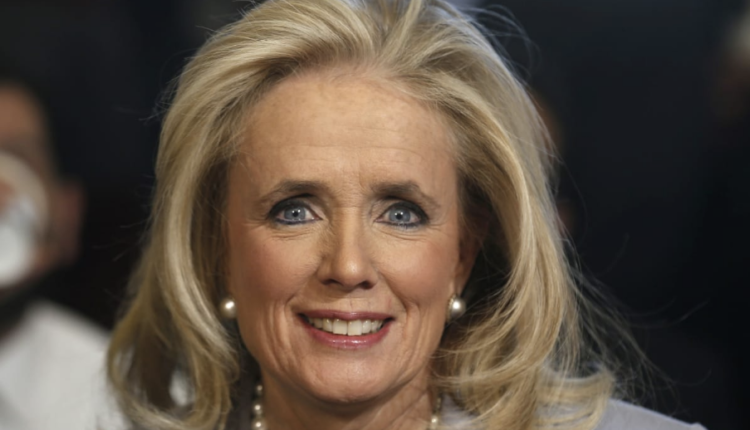Ann Arbor U.S. Rep. Dingell, Jayapal and Sanders Reintroduce Legislation: Medicare for All
by Kyle Davidson
U.S. Reps. Debbie Dingell (D-Ann Arbor) and Pramila Jayapal (D-Wash.) and U.S. Sen. Bernie Sanders (I-Vt.) gathered Wednesday with Democratic colleagues and advocates from across the country for a Washington, D.C., rally following the reintroduction of Medicare for All bills in Congress.
According to a statement from Dingell’s office, the reintroduction of Medicare for All received a record number of cosponsors in the House, generating support from 112 cosponsors, including 13 committee ranking members. Sanders said the Senate version of the bill has 14 cosponsors with more on the way.
Dingell’s late father-in-law, former U.S. Rep. John Dingell Sr., drafted the first piece of legislation during the New Deal era that led to the creation of Medicare. Her late husband, former U.S. Rep John Dingell, the longest-serving member of Congress in history, introduced single-payer health care legislation each session he served.
“When [John Dingell] died, the day of his death, I promised him I’ll get this bill over the finish line,” Dingell said. “He talked about that in the last hour of his life. He knew how many people needed access to health care and how they couldn’t afford to go to a doctor.”
“We cannot give up and we’re not going to stop until every single American has access to health care that they need,” Dingell said.
The proposed changes would guarantee access to federal health insurance to ensure eligibility for anyone living in the U.S.
However, the bill will likely face an uphill battle in the House with Democrats currently in the minority, holding 213 seats compared to Republicans’ 222.
The bill’s lead sponsors were joined by U.S. Reps. Veronica Escobar (D-Texas), Robert Garcia (D-Calif.), Maxwell Frost (D-Fla.), Jamaal Bowman (D-N.Y.) and Jim McGovern (D-Mass.), who hosted the first congressional hearing on Medicare for All in 2019. Members from National Nurses United, the Center for Popular Democracy, and People’s Action were also present and spoke in support of the bills.
U.S. Reps. Rashida Tlaib (D-Detroit), Barbara Lee (D-Calif.), Jill Tokuda (D-Hawaii),Valerie Foushee (D-N.C.), Greg Casar (D-Texas) and Troy Carter (D-La.) were also present, but did not speak at the event.
If signed into law, Medicare for All would be implemented over a two-year period, with persons 55 and older and 19 and younger becoming eligible a year after the law is enacted, and all other people living in the U.S. becoming eligible a year later. The policy would provide comprehensive health care coverage for all primary care, long-term care, hospital and outpatient services, as well as dental, vision, audiology, women’s reproductive health services, mental health and substance abuse treatments, telehealth, laboratory and diagnostic services, ambulatory services and more.
The policy would also provide recipients with freedom to choose health care providers without having to worry if that provider is in-network to receive coverage.
Medicare for All also aims to reduce medical spending and prescription drug costs, by moving the system from a multi-payer model to a single-payer model, and giving Medicare the power to issue compulsory licenses to allow production of generic versions of drugs if pharmaceutical companies refuse to negotiate a reasonable price.
At the event, the policy’s supporters shared frustrations about the affordability and effectiveness with the nation’s health care system.
“The message of Medicare for All is simple: health care is a human right. Everybody in and nobody out,” Jayapal said.
“It is outrageous that in the richest country in the world, more than 85 million people are uninsured or underinsured… millions are drowning in medical debt, millions more are one broken bone, one car accident, one new prescription away from medical bankruptcy,” Jayapal said.
Jayapal also criticized employer-provided health care coverage, noting that 27 million Americans lost their jobs and were left without health care during the COVID-19 pandemic.
Dingell said the pandemic shined a light on flaws in a “broken” health care system.
“People say, ‘I’m not going to get my mammogram. I’m not going to take the prostate test, because even if I’m positive, I can’t afford the treatment. I can’t get it.’ That is morally wrong and unacceptable,” Dingell said.
Sanders addressed criticisms against Medicare for All.
“People say ‘Well you know Medicare for All, you want to guarantee health care to people? That’s expensive.’ It is. But it is less expensive than the dysfunctional broken system that we have right now,” Sanders said.
“What everybody up here wants to do is we want to put money into doctors and nurses and getting kids healthy and preventative healthcare. We want our dollar to go to health care, not to huge profits for the drug companies and the insurance companies,” Sanders said.
Deborah Burger, one of the presidents of National Nurses United, echoed Sanders’ criticism.
“This system is ineffective, inefficient and unjustifiably unaffordable for our patients and for our country, but it is not inefficient or ineffective in getting profits for all of these companies,” Burger said.
“It doesn’t prioritize wellness. It doesn’t provide true health care and it second guesses all of the doctors that provide and prescribe treatments and medications and therapies for patients,” Burger said.


Comments are closed, but trackbacks and pingbacks are open.